
Bayeux is a commune in the Calvados department in Normandy in northwestern France.

La Cambe is a Second World War German military war grave cemetery, located close to the American landing beach of Omaha, and 25.5 km (15.8 mi) north west of Bayeux in Normandy, France. It is the largest German war cemetery in Normandy and contains the remains of over 21,200 German military personnel. Initially, American and German dead were buried in adjacent fields but American dead were later disinterred and either returned to the US or re-interred at the Normandy American Cemetery and Memorial, 15 km (9.3 mi) away. After the war over 12,000 German dead were moved from approximately 1,400 field burials across Normandy to La Cambe. The cemetery is maintained and managed by the voluntary German War Graves Commission.

Hottot-les-Bagues is a commune in the Calvados department and Normandy region of north-western France.

The Battle for Caen is the name given to fighting between the British Second Army and the German Panzergruppe West in the Second World War for control of the city of Caen and its vicinity during the larger Battle of Normandy. The battles followed Operation Neptune, the Allied landings on the French coast on 6 June 1944 (D-Day).

The Bény-sur-Mer Canadian War Cemetery is a cemetery containing predominantly Canadian soldiers killed during the early stages of the Battle of Normandy in the Second World War. It is located in and named after Bény-sur-Mer in the Calvados department, near Caen in lower Normandy. As is typical of war cemeteries in France, the grounds are beautifully landscaped and immaculately kept. Contained within the cemetery is a Cross of Sacrifice, a piece of architecture typical of memorials designed by the Commonwealth War Graves Commission.

Orglandes War Cemetery is a German World War II cemetery in Normandy, France. It is located on the northern edge of the village of Orglandes, about 30 km (19 mi) south east of Cherbourg and 7 km (4.3 mi) west of Sainte-Mère-Église on the Cotentin Peninsula. The burials come from summer 1944, immediately following D-Day and the Battle of Normandy. It is the second smallest of the six German war cemeteries in Normandy with a little over 10,000 burials. The cemetery is maintained and managed by the voluntary German War Graves Commission.

The Bayeux War Cemetery is the largest Second World War cemetery of Commonwealth soldiers in France, located in Bayeux, Normandy. The cemetery contains 4,648 burials, mostly of the Invasion of Normandy. Opposite this cemetery stands the Bayeux Memorial which commemorates more than 1,800 casualties of the Commonwealth forces who died in Normandy and have no known grave.
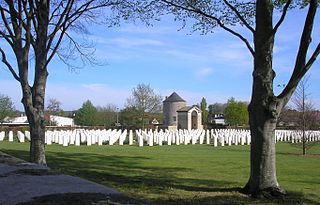
Ranville War Cemetery is a Second World War cemetery of Commonwealth soldiers in France, located in Ranville, 10 km (6.2 mi) north east of Caen, Normandy. The cemetery contains predominantly British soldiers killed during the early stages of the Battle of Normandy. A large proportion of those interred were members of the British 6th Airborne Division. The cemetery is maintained by the Commonwealth War Graves Commission.
Philip Dalton Hepworth was a British architect. He studied in both the UK and France, at the Architectural Association School of Architecture and the École des Beaux-Arts, and returned to work as an architect after serving in the First World War. He rose to prominence in the 1930s, featuring in a book by architectural critic Trystan Edwards and winning the commission in 1932 to design Walthamstow Town Hall, which was eventually completed in 1942. Another civic building of this period was Wiltshire County Hall at Trowbridge. He also designed a handful of private houses, including Pemberley, in Loughton, 1936. He lived in Zoffany House in Strand-on-the-Green, Chiswick, London, from 1936.

Banneville-la-Campagne War Cemetery is a Second World War cemetery of Commonwealth soldiers located close to the commune of Banneville-la-Campagne, 11 km (6.8 mi) east of Caen, Normandy, France. The graveyard contains 2,175 graves of which 140 are unidentified The cemetery is maintained by the Commonwealth War Graves Commission.
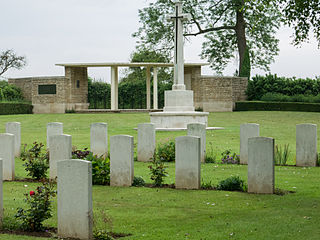
Cambes-en-Plaine War Cemetery is a Second World War cemetery of Commonwealth soldiers in France, located seven km northwest of Caen, Normandy. The cemetery contains 224 graves of which one is unidentified.

Hermanville War Cemetery is a Second World War cemetery of Commonwealth soldiers in France, located 13 km north of Caen, Normandy. The cemetery contains 1,003 commonwealth war graves.

Hottot-les-Bagues War Cemetery is a British Second World War cemetery of Commonwealth soldiers in France, located 15 km south-west of Bayeux, Normandy. The cemetery contains 1,005 commonwealth war graves and 132 German war graves.
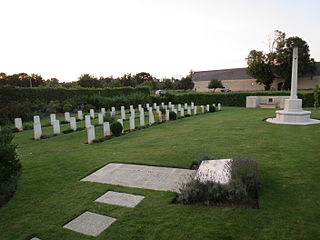
Jerusalem War Cemetery is one of the smallest Second World War cemetery of Commonwealth soldiers in Normandy, France. It is located between Bayeux and Tilly-sur-Seulles, close to the commune of Chouain. The cemetery contains 46 Commonwealth war graves, 1 Czech grave, and 1 unknown British grave.

Grainville-Langannerie Polish war cemetery is the only Polish Second World War cemetery in France. It is located 17 km south of Caen, Normandy, and contains 696 Polish war graves. It is one of seven military cemeteries now maintained by the French state.

La Délivrande war cemetery is a Second World War cemetery of Commonwealth soldiers in France, located 14 km (8.7 mi) north of Caen, Normandy. The cemetery contains 943 commonwealth war graves and 180 German war graves.

Ryes War Cemetery is a Second World War cemetery of Commonwealth soldiers located close to the commune of Bazenville, 8 km (5.0 mi) east of Bayeux, Normandy, France. The graveyard contains 653 Commonwealth war graves, one Polish and 335 German war graves. The cemetery is maintained by the Commonwealth War Graves Commission.
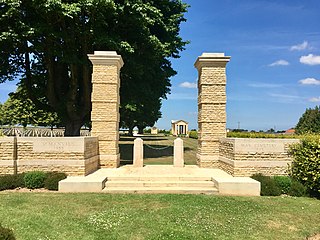
Saint-Manvieu War Cemetery is a British Second World War cemetery of Commonwealth soldiers in France, located 10 km west of Caen, Normandy. The cemetery's designation often uses the nearby commune of Cheux but the graveyard is actually closer to the commune of Saint-Manvieu-Norrey. The graveyard contains 1,627 Commonwealth war graves and 555 German war graves. The cemetery is maintained by the Commonwealth War Graves Commission.
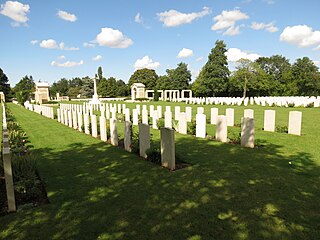
Tilly-sur-Seulles War Cemetery is a British Second World War cemetery of Commonwealth soldiers located in the village of Tilly-sur-Seulles, some 13 km (8.1 mi) south of Bayeux in Normandy. The cemetery contains 990 Commonwealth burials and 232 German graves.























